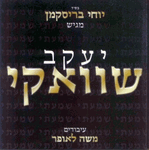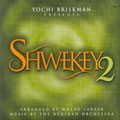Dec. 28, 2003

Jewish Community Radio: And we are back here on Jewish Community Radio and we are going to our special guest interview of the week, Yaakov Shwekey. Good morning Yaakov.
Yaakov Shwekey: Good morning, good morning. How are you doing?
Jewish Community Radio: Weíre dong excellent. This is an honor and a pleasure. We just had your brother on, who gave a beautiful Dvar Torah. We played his composition, Ha Melamed. And weíre just excited to be able to talk to you. Cleveland is a big fan area. Not only because of your brother, but because of your music.
Yaakov Shwekey: Right. Iíd like to thank you, the radio station the fans, everybody that listening to the music out there. Thank you so much. I appreciate it. My brotherís a tough act to follow.
Jewish Community Radio: Heís your older brother?
Yaakov Shwekey: Older.
Jewish Community Radio: Now it seems to me that youíre one of the most well known names in Jewish music. In fact this Shabbos when all these kids came up to me they asked, ďwhoís your special guest? Yaakov Shwekey?! Wow, heís the best! He has seven, eight albums!Ē And in reality, you have what, three albums?
Yaakov Shwekey: I have three albums.
Jewish Community Radio: And the first one came out in 2001?
Yaakov Shwekey: Thatís correct.
Jewish Community Radio: So how did you become so big in three albums and being relatively new?
Yaakov Shwekey: Well, itís not something that you can really put your hands on and control. People have to feel what your singing and people have to accept the tune and really relate to them. Each sect -- Iím talking about Hasidim, people in Israel, different types, different background, different cultures -- thank G-d theyíve all been accepting the music. each one liking it for some reason. You got to attribute that to just the help of G-d. Itís very hard to pick songs and to sing what everybodyís going to like. Amongst the Jewish people you have different backgrounds and the tunes that weíve been putting out people have really been relating to it. I really appreciate that.
Jewish Community Radio: One thing Iíve noticed is, besides obviously your voice, is that you have a mix of a lot of different composers, which I think gives it a very interesting sound. So weíre not always hearing one sound. You took the best of basically every good Jewish composer out there. Is that right?
Yaakov Shwekey: Yeah. Thatís what we were trying to do. Weíre trying a diverse mix of songs. It does take hard work because I do go down to a lot of the composers and I sit down with them and I really tweak the songs to my liking. It takes time to get a diverse mix. I like to do that sometimes. To get everybodyís taste in one album. Thatís nice to hear a bunch of songs from different people.
Jewish Community Radio: Let's talk about your latest album BSimcha. I thought that was interesting because lately thereís been a lot of these wedding albums. How did you come to creating this album and what led to making it different?
Yaakov Shwekey: Well Iíll tell you the truth. When my producer came up with the idea we were on the way to Mexico City doing a big show over there and on the plane he asked me, you know what? Iíve been thinking about doing this wedding album. I said, naaa, everybody comes out with that. I want to do something different. I said you know, we got to make it something that weíre going to take time with to make it special. And I donít mean to knock anybody else. Iíve heard some nice stuff. I just wanted to make it my own. The selection of songs has a big part in the wedding albums because usually the wedding albums are just whatís out today in weddings. We like to pick stuff with substance, as they say. It took a long time just to pick the material for the album. And I think Eli Laufer also, the person that I worked with in terms of choir, also put a lot of time into it. It was not just done overnight. It was time consuming. One thing that made it special there were many beautiful songs, just the way it came out, the way I recorded it. There was a Bobover song that nobody knew, it just surprised people.
Jewish Community Radio: There were a lot of songs you brought back into the fold.
Yaakov Shwekey: Iíd like to thank also on the radio Yochi Briskman the one who arranged, my producer, heís the one who arranged this album and put everything together. He did an unbeleavable job. Heís mister wedding himself. Heís been doing weddings for a long, long time. I donít know how many years but now his daughterís engaged heís making his own wedding. Even before his daughter was born he was playing at weddings.
Jewish Community Radio: Let's talk about the songs Racheim, speaking of weddings. That might be the most requested song at weddings.
Yaakov Shwekey: True, true. I mean the song Raheim, I could just tell your audience, has so many stories behind it. The song Racheim is talking about, we say in benchting, "raheim", we ask Hashem to have mercy on our people in Yerushalayim and unfortunately it came at a time that we really did need to ask Hashem for mercy. And whatís going on with the bombings and people just getting killed and sprees from Arabs, and it was just people related to the song. So much unfortunately, because of the incidents, but I had so many stories from radio stations, even in Israel. Iíll give you one small example. One girl called up a famous radio station. She said, you know Iíve had a past, I came from a very religious home, and I just, something happened during the course of my years, she didnít say exactly what, and she went off into her own way and she decided that sheís not going to abide by the exact ways her parents did. And they played Raheim on the radio so many times in Israel and she put on the radio in the car on the way going to somewhere and she heard this song. She said she pulled over and she was just listening and tears were rolling down out of her eyes. She said she had to call the radio station and say that everything -- all her ideas, off the right path, and not doing the right thing -- just went right out the window. She said the song sparked in her heart, her past -- her parents ways, the religious ways, the way to go -- and she said, Iím calling up to say that this song, tell whoever sings it, I donít know him, but you should tell him it had a tremendous impact on my life. Just give it five minutes of listening to the song. Thatís just one of many, many stories all around the world. Iíve got calls from Poland, from anywhere. All the unexpected calls Iíve gotten, that the song had tremendous, tremendous impact on people. Itís amazing.

Jewish Community Radio: What do you think of that album that came out, Iím So Sick of Raheim?
Yaakov Shwekey: (laughing). I mean, the person that put out the album, I donít know, you could look at it in many ways. He felt that the song was so big. That heís got to put out something. First of all he wanted to do something in business for himself. I guess itís a good business proposition. And he just felt that the song is so big you could sell stuff.
Jewish Community Radio: As a parody to it.
Yaakov Shwekey: Exactly. Why not make some money. He didnít mean to shame the song, or degrade the song in any way. He just felt to make a joke. And itís worked for him. I mean he didnít have to put so much effort into that album.
Jewish Community Radio: With your help it worked. Because when we had Simcha Mann, I donít know, probably you know him, from the Kol Simcha Orchestra in here, we had a live "concert" in here a week ago that was one of the requests. To sing Racheim live on the air.
Yaakov Shwekey: I got to say, once you mentioned Simcha Mann. I do know him. Iíve gotten to know him on a couple occasions. A wonderful, wonderful man. You have a good band out there.
Jewish Community Radio: Yes, yes, thank you. And this is what he said. When it was requested, Raheim, we talked about Iím So Sick of Raheim, and I personally did not play song on our radio. I played that other one about the guy who lost his galoshes or something.
Yaakov Shwekey: (laughing)
Jewish Community Radio: But Simcha said right then and there, itís still the number one requested song at every celebration.
Yaakov Shwekey: Yeah. I mean, I think if youíre asking me for my opinion, if I hold putting out such an album, I would never do something like that. Because I donít feel itís the right thing to do for a song that hit so many people and inspired so many people. You donít want to mock. You know it is said in the Gemara and in other places that if somebody sings something so emotional, something so moving and one guy cracks a joke, one joke can ruin a hundred tachuchis. And I feel if it only ruined a couple peopleís contact with the song, itís not something that I would do.
Jewish Community Radio: Did you know they were going to do that, put that album out?
Yaakov Shwekey: No, I didnít. But I donít feel that it lessened the impact of the song.
Jewish Community Radio: Yeah, you were laughing a little too just before, we noticed.
Yaakov Shwekey: Yeah, I donít hold it against people. Itís a fly by night thing for me.
Jewish Community Radio: So letís play a little Shwekey. Weíre going to play Raheim and then come back here on Jewish Community RadioÖ. And we are back here on Jewish Community Radio with Yaakov Shwekey. Yaakov, do you have any final words for our listening audience?
Yaakov Shwekey: Yes I do. Iíd like them all to continue listening to Jewish Community Radio and listening to Jewish music because Jewish music is not just words that people composed themselves. Itís the words of our David HaMelech, tehillim, a lot of holy words that weíre singing. They mean a lot. In my second album actually it translated the words inside. Like we said on Raheim, we ask Hashem to have pity. Itís a prayer. Itís not just a song. We connect with G-d and ask Him to have mercy. Iíd like to ask everybody to continue listening to Jewish music and thank you for having me on and please everybody continue on this right path. Also in happy songs. Not only in songs do we have to ask for mercy, thereís the songs that make you dance and the songs that make you happy. Because the only way people go on in life, the right way, is if theyíre happy. Because in all the books, that happiness is the main midah, is the main character trait, that you have to have. You have to have happiness going through life. And that will get you closer to Hashem. Everybody, thank you so much listening, thank your for having me on, and Cleveland, listen, take care of my brother!
